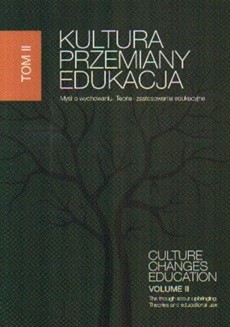School and pedagogical thought in „after-moderness” – civilisational and social contexts
Keywords:
globalisation, after-moderness, educational and upbringing theoriesAbstract
Globalisation of the contemporary world causes transfromations of basic educational environments. Authorities and means as well as ways of educational influence are also changing. The contemporary pedagogical theory and practice must take into consideration transformations taking place, and as it turns out it is generally too pragmatic and utilitarian in its functions and attitudes. It restricts its goals and tasks mainly to extemporaneous preparing young people to current professional roles, to teaching them adequate skills and vocational competencies, as well as a various immediate practical functionality. It cares less about preparation of pupils to sensible and rational life, obtaining happiness and great life satisfaction, recognising the role and meaning of the value of higher culture in their life, deepened reflexion over the existence and its sense. Besides, the current pedagogical theory is unsatisfactorily critical, and too excessively affirmative in relations to the technical civilisation and the global neoliberal social-economic system. Realia of the modern epoch arise and inspire a need of a new educational and upbringing thought, new paradigmates of this thought, and in a consequence aslo new, detailed pedagogical conceptions and theories.
Downloads
References
Banach Cz., Reformy szkolne w Polsce. Wiek XX [w:] Encyklopedia pedagogiczna XXI wieku, t. V, Warszawa 2006.
Denek K., Potrzeba transformacji szkolnictwa wyższego, „Nowa Szkoła” 2008, nr 66.
Kutz P., Education for the Future: The Liberating Arts, „Free Inquiry”. Celebrating Reason and Humanity, August/September 2010, vol. 30, no. 5.
Kuźma J., Nauka o szkole. Studium monograficzne. Zarys koncepcji, wyd. II zm., uzupeł., Kraków 2008.
Michalik M., W kręgu współczesnych kontrowersji etycznych, Biblioteka „Res Humana”, Warszawa 2012.
Nocuń A., Edukacja naszych czasów, „Gazeta Wyborcza”, 26 kwietnia 2013.
Ostasz L., Dobre, złe, odpowiedzialne, sprawiedliwe, Biblioteka „Res Humana”, Warszawa 2010.
Reeves B., Nass C., Media i ludzie, przeł. H. Szczerkowska, Warszawa 2005.
Szewczyk K., Wychować człowieka mądrego, Warszawa 1998.
Szmyd J., Czy w świecie „płynnej nowoczesności” można budować ogólną teorię wychowania? [w:] Szkoła wobec wyzwań XXI wieku, t. 1: W poszukiwaniu humanistycznego (antropologicznego) wymiaru myśli pedagogicznej, red. K. Szmyd, E. Dolata, A. Śniegulska, Rzeszów 2012.
Szmyd J., Edukacja „drugiego dna”. Wychowanie i edukacja w koncepcji ponowoczesności Zygmunta Baumana, „Zeszyty Naukowe Uniwersytetu Rzeszowskiego. Pedagogika i Psychologia”, Rzeszów 2004.
Szmyd J., Kryzys wychowania, „Dziś. Przegląd społeczny”, nr 11(194), listopad 2006.
Szmyd J., O potrzebie nowego paradygmatu pedagogicznego w dobie ponowoczesności (w druku).
Szmyd J., Wyzwania i poszukiwania edukacyjne. Szkice z pogranicza filozofii wychowania, Kraków 2002.
Tymieniecka A.T., The New Enlightenment, „Philosophical Inquiry. A Review of Philosophical Ideas and Trends”, vol. XXXII, October 2008.
Zacher L.W., Obecne i przyszłe konteksty rozwoju edukacji (Refleksje, predykcje, pytania), „Transformacje. Pismo interdyscyplinarne” 2011.
Downloads
Published
How to Cite
Issue
Section
License
Copyright (c) 2014 KULTURA – PRZEMIANY – EDUKACJA

This work is licensed under a Creative Commons Attribution-NoDerivatives 4.0 International License.


